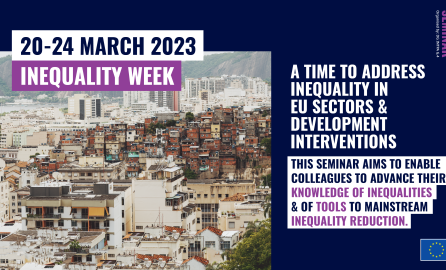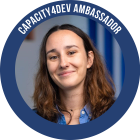In this context, from 20 to 24 March 2023, DG INTPA Unit G.4, responsible for social inclusion & protection, health & demography, together with 7 units and external organisations (OXFAM, IMF, AFD, and UN Habitat, to name a few) conducted a 5-day online seminar attended by more than 100 participants. This seminar equipped participants with the knowledge and tools necessary to address and reduce inequality in policy and programme design and implementation.
Inequality Week was a key moment of interaction and practical experience-sharing among DG INTPA Units, EU Delegations and experts, who all brought different perspectives to the table. The use of a new platform called Howspace (created with the support of the MKS1 Learning Team) facilitated engagement amongst participants, speakers and facilitators, making this seminar truly interactive.
Inequality Week was organised around thematic sequences and sessions addressing topics such as understanding definitions of inequality, how inequalities are measured, what drives them, how different policies are likely to affect inequalities at different levels, and much more. It was very important to highlight how inequality intersects with sectors like health, social protection and taxation, for example. Emphasising how interconnected all these elements are, was what made conducting thematic seminars a priority for the unit.
On this occasion, Unit G.4 presented the Inequality Marker (I-Marker), officially launched in June this year. This concrete and innovative tool will enable the EU to better understand, track and benchmark its impact across all sectors on inequalities.2 The I-Marker will assess whether and to what extent inequality reduction is an objective of all DG INTPA interventions, against a set of well-defined criteria. The Marker will be fundamental in understanding what drives inequality in a specific sector or country, in helping officials set goals and plan activities to fight inequalities and in targeting the most vulnerable groups in each intervention.
Insights from Inequality Week 2023
Reducing inequalities is possible, especially if development professionals follow the 4 Guiding Principles in the programming cycle:3
- A Beneficiary Approach: involvement and social dialogue. Particular focus should be given to the prioritisation of effective targeting and beneficiaries’ involvement (especially the most vulnerable) throughout project and/or intervention design. Different actors at various levels and in different sectors should collaborate to identify and address inequalities.
- Accountability. Lack of transparency enables corruption and hinders access to reliable information, which limits access to opportunities for citizens. Enhancing transparency will help foster the creation of spaces for civil society participation while amplifying those marginalised voices. In addition, promoting participation and institutional accountability enhances inclusive policies, transparency in decision-making and much more. It also contributes to better planning, monitoring and evaluation of the impacts of policies on inequality.
- (Re)distribution: targeting the bottom 40%. Lifting the bottom 40% while ensuring fair contributions from the top 10% must be a priority in the reduction of inequality, in alignment with Sustainable Development Goal 10.1.
- Geographical targeting to address spatial inequality. Inequality is not only present amongst groups of people and at the level of income, gender, ethnicity, religion, disability, etc., but it can also express itself at the territorial and geographical level.
Development professionals must acknowledge that inequalities are an obstacle to all SDGs and that all interventions should be assessed ex-ante and ex-post through an inequality lens. This implies asking the right questions when identifying who, where and how regarding the specific parts of the population that will be targeted by interventions.
All in all, the seminar emphasised how multifaceted and intersectional addressing inequalities in EU interventions (and beyond) can be. A successful and effective approach will always have to be comprehensive and adaptive, so that we can move closer to a world where opportunities and outcomes are more equitable. This will ultimately contribute to sustainable and more inclusive development.
______
1. Methodological and Knowledge Sharing. Special thanks to the Learning Team and for their work to make this important seminar possible: Luciana Popescu, Jaber Oukhiti, Stella Wolf.
2. https://capacity4dev.europa.eu/discussions/ec-launched-inequality-marker-0_en
3. Tools and Methods Series, Reference Document Nº 29, September 2021.








(1)
Log in with your EU Login account to post or comment on the platform.
We are so used to inequalities around us, in the professional field or everyday life, that we are barely noticing it. I believe that EC professionals should be on the front line to set an example to follow by all.